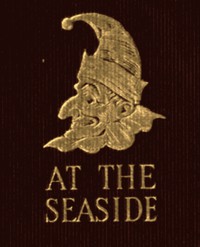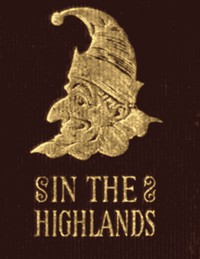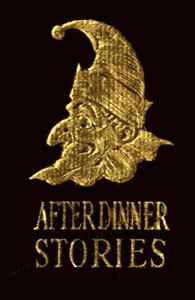Mr. Punch at the Seaside, J. A. Hammerton [romantic books to read .txt] 📗

- Author: J. A. Hammerton
Book online «Mr. Punch at the Seaside, J. A. Hammerton [romantic books to read .txt] 📗». Author J. A. Hammerton
[Pg 95]

Boy (to Brown, who is exceedingly proud of his sporting appearance). "Want a donkey, mister?"
[Pg 96]
 "NICE FOR THE VISITORS"
(Sketch outside a fashionable hotel)
"NICE FOR THE VISITORS"
(Sketch outside a fashionable hotel)
[Pg 97]
 INCORRIGIBLE
INCORRIGIBLE
Visitor. "Well, my man, I expect it must have cost you a lot of money to paint your nose that colour!"
Reprobate. "Ah, an' if Oi cud affoord it, Oi'd have it varnished now!"
[Pg 98]
 "NO ACCOUNTING FOR TASTE"
"NO ACCOUNTING FOR TASTE"
Materfamilias (just arrived at Shrimpville—the children had been down a month before). "Well, Jane, have you found it dull?"
Nurse. "It was at fust, M'm. There was nothink to improve the mind, M'm, till the niggers come down!!"
[Pg 99]
 BY THE SAD SEA WAVES
BY THE SAD SEA WAVES
"But, are you sure?"
"Yus, lady. 'E's strong as an 'orse!"
"But how am I to get on?"
"Oh, I'll lift yer!"
[Pg 100]
 DELICATE ATTENTION
DELICATE ATTENTION
Confiding Spinster. "I'm afraid the sea is too cold for me this morning, Mr. Swabber."
Bathing Man. "Cold, miss! Lor' bless yer, I just took and powered a kittle o' bilin' water in to take the chill off when I see you a comin'!"
[Pg 101]
 HOLIDAY PLEASURES
HOLIDAY PLEASURES
Injured Individual. "Heigho! I did think I should find some refuge from the miseries of the seaside in the comforts of a bed! Just look where my feet are, Maria!"
His Wife. "Well, John! it's only for a month, you know!"
[Pg 102]
 BLIGHTED HOPES
BLIGHTED HOPES
Extract of letter from Laura to Lillie:—"I declare, dear, I never gave the absurd creature the slightest encouragement. I did say, one evening, I thought the little sandy coves about Wobbleswick were charming, especially one. The idea!—of his thinking I was alluding to him!"—— &c., &c.
[Pg 103]
 SENSITIVE
SENSITIVE
"I think I told you, in my letter of the first of October, of his absurd interpretation of an innocent remark of mine about the sandy shores of Wobbleswick. Well, would you believe it, dear! we were strolling on the Esplanade, the other day, when he suddenly left Kate and me, and took himself off in a tremendous huff because we said we liked walking with an object!!"
[Extract from a later letter of Laura's to Lillie.
[Pg 104]
 PREHISTORIC PEEPS
"No bathing to-day!"
PREHISTORIC PEEPS
"No bathing to-day!"
[Pg 105]
 PREHISTORIC PEEPS
PREHISTORIC PEEPS
A Nocturne which would seem to show that "residential flats" were not wholly unknown even in primeval times!
[Pg 106]

Blinks. "The sun 'll be over the yard-arm in ten minutes. Then we'll have a drink!"
Jinks. "I think I'll have one while I'm waiting!"
[Pg 107]
 TRIALS OF A CONVALESCENT
TRIALS OF A CONVALESCENT
Tompkins (in a feeble voice, for the fourth or fifth time, with no result). "Chairman!!! chairman!!!"
That Awful Boy. "Lydies and gentlemen——!!"
[Pg 108]
SEASIDE ASIDES (Paterfamilias in North Cornwall)
Oh! how delightful now at last to come
Away from town—its dirt, its degradation,
Its never-ending whirl, its ceaseless hum.
(A long chalks better, though, than sheer stagnation.)
For what could mortal man or maid want more
Than breezy downs to stroll on, rocks to climb up,
Weird labyrinthine caverns to explore?
(There's nothing else to do to fill the time up.)
Your honest face here earns an honest brown,
You ramble on for miles 'mid gorse and heather,
Sheep hold athletic sports upon the down
(Which makes the mutton taste as tough as leather).
The place is guiltless, too, of horrid piers.
And likewise is not Christy-Minstrel tooney;
No soul-distressing strains disturb your ears.
(A German band has just played "Annie Rooney".)
The eggs as fresh as paint, the Cornish cream
The boys from school all say is "simply ripping."
The butter, so the girls declare, "a dream."
(The only baccy you can buy quite dripping.)
[Pg 109]A happiness of resting after strife,
Where one forgets all worldly pain and sorrow,
And one contentedly could pass one's life.
(A telegram will take me home to-morrow.)
Scene: Margate Beach on Easter Monday.—First Lady. "Oh, here comes a steamer. How high she is out of the water."
Second Lady. "Yes, dear, but don't you see? It's because the tide's so low."
 AWKWARD
AWKWARD
The aristocratic Jones (rather ashamed of his loud acquaintance, Brown). "You must excuse me, but if there's one thing in the world I particularly object to, it's to having anybody take my arm!"
Brown. "All right, old fellow!—you take mine!"
THE SEASIDE VISITOR'S VADE MECUM.Question. Is it your intention to leave London at once to benefit by the ocean breezes on the English coast?
Answer. Certainly, with the bulk of my neighbours.
Q. Then the metropolis will become empty?
A. Practically, for only about three and a half millions out of the four millions will be left behind.
Q. What do you consider the remaining residuum?
A. From a West End point of view a negligible quantity.
Q. Do not some of the Eastenders visit the seaside?
A. Yes, at an earlier period in the year, when they pay rather more for their accommodation than their neighbours of the West.
Q. How can this be, if it be assumed that the East is poorer than the West?
A. The length of the visit is governed by the weight of the purse. Belgravia stays a couple of months at Eastbourne, while three days at Margate is enough for Shoreditch.
Q. Has a sojourn by the sea waves any disadvantages?
A. Several. In the first instance, lodgings are frequently expensive and uncomfortable. Then there is always a chance that the last lodgers may have occupied their rooms as convalescents. Lastly, it is not invariably the case that the climate agrees with himself and his family.
Q. And what becomes of the house in town?
A. If abandoned to a caretaker, the reception rooms may be used by her own family as best chambers, and if let to strangers, the furniture may be injured irretrievably.
Q. But surely in the last case there would be the certainty of pecuniary indemnity?
A. Cherished relics cannot be restored by their commonplace value in money.
Q. Then, taking one thing with another, the benefit of a visit to the seaside is questionable?
A. Assuredly; and an expression of heartfelt delight at the termination of the outing and the consequent return home is the customary finish to the, styled by courtesy, holiday.
Q. But has not the seaside visit a compensating advantage?
A. The seaside visit has a compensating advantage of overwhelming proportions, which completely swallows up and effaces all suggestions of discomfort—it is the fashion.
[Pg 110]
 PARIS?
PARIS?
"Not if I know it! Give me a quiet month at the seaside, and leave me alone, please!"
[Pg 111]
 CONVERSATIONAL PITFALLS
CONVERSATIONAL PITFALLS
Irene. "Do you remember Kitty Fowler?"
Her Friend. "No, I don't."
Irene. "Oh, you must remember Kitty. She was the plainest girl in Torquay. But I forgot—that was after you left!"
[Pg 112]

Visitor. "Have you ever seen the sea-serpent?"
Boatman. "No, sir. I'm a temperance man."
[Pg 113]
 SEPARATE INTERESTS
SEPARATE INTERESTS
Husband. "Hi! Maria! Take care of the paint!"
Painter. "It don't matter, ma'am. It'll all 'ave to be painted again!"
[Pg 114]
 CAUTION TO YOUNG LADIES WHO RIDE IN CRINOLINE ON DONKEYS
CAUTION TO YOUNG LADIES WHO RIDE IN CRINOLINE ON DONKEYS
[Pg 115]
 MARGATE
MARGATE
Chatty Visitor. "I like the place. I always come here. 'Worst of it is, it's a little too dressy!"
[Pg 116]
 UNLUCKY COMPLIMENTS
UNLUCKY COMPLIMENTS
Shy but Susceptible Youth. "Er—could you tell me who that young lady is—sketching?"
Affable Stranger. "She has the misfortune to be my wife!"
Shy but Susceptible One (desperately anxious to please, and losing all presence of mind). "Oh—the misfortune's entirely yours, I'm sure!"
[Pg 117]
Brilliant Suggestion (Overheard at the Seaside).—She. "So much nicer now that all the visitors have gone. Don't you think so?"
He. "Yes, by Jove! So jolly nice and quiet! Often wonder that everybody doesn't come now when there's nobody here, don't you know!"
 A NUISANCE.
A NUISANCE.
Miss Priscilla. "Yes; it's a beautiful view. But tourists are in the habit of bathing on the opposite shore, and that's rather a drawback."
Fair Visitor. "Dear me! but at such a distance as that—surely——"
Miss Priscilla. "Ah, but with a telescope, you know!"
[Pg 118]
THE SEASIDE PHOTOGRAPHER
I do not mean the Kodak fiend,
Who takes snap-shots of ladies dipping,
And gloats o'er sundry views he's gleaned
Of amatory couples "tripping."
No, not these playful amateurs
I sing of, but the serious artist,
Who spreads upon the beach his lures,
What time the season's at its smartest.
His tongue is glib, his terms are cheap,
For ninepence while you wait he'll take you;
Posterity shall, marv'lling, keep
The "tin-type" masterpiece he'll make you.
What though his camera be antique,
His dark-room just a nose-bag humble,
What if his tripod legs are weak,
And threaten constantly to tumble.
[Pg 119]No swain nor maiden can withstand
His invitation arch, insidious,
To pose al fresco on the strand—
His client�le are not fastidious.
"You are so lovely", says the wretch,
"Your picture will be quite entrancing!"
And to the lady in the sketch
I overheard him thus romancing.
 THE RULING PASSION
THE RULING PASSION
Sir Talbot Howard Vere de Vere. "Ah! Good morning, Mrs. Jones! Dreadful accident just occurred. Poor young lady riding along the King's Road—horse took fright—reared, and fell back upon her—dreadfully injured, I'm sorry to say!"
Mrs. Woodbee Swellington Jones. "Quite too shocking, dear Sir Talbot! Was she—er—a person of position?"
Sir Talbot Howard Vere de Vere. "Position, by George!! Dooced uncomfortable position, too, I should say!"
[Pg 120]
 FOR THE PUBLIC GOOD
FOR THE PUBLIC GOOD
Bertie. "Gertie, do just go back to the beach and fetch me a baby (you'll find a lot about), and I'll show you all the different ways of saving it from drowning!"
ANNALS OF A WATERING-PLACE THAT HAS "SEEN ITS DAY" TYNEMOUTH
TYNEMOUTH
The weather which, in Mr. Dunstable's varied experience of five-and-twenty years, he assures me, has never been so bad, having at length afforded some indications of "breaking", I make the acquaintance, through Mrs. Cobbler, of Mr. Wisterwhistle, proprietor of the one bath-chair available for the invalid of Torsington-on-Sea, who, like myself, stands in need of the salubrious air of that health-giving resort, but who is ordered by his medical adviser to secure it with the least possible expenditure of physical strength.
 INDIAMAN GOING INTO PORT
INDIAMAN GOING INTO PORT
Both Mr. Wisterwhistle and his chair are peculiar in their respective ways, and each has a decided[Pg 122] history. Mr. Wisterwhistle, growing confidential over his antecedents, says, "You see, sir, I wasn't brought up to the bath-chair business, so to speak, for I began in the Royal Navy, under His Majesty King William the Fourth. Then I took to the coastguard business, and having put by





Comments (0)